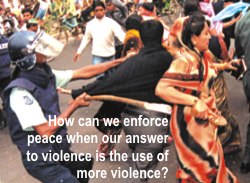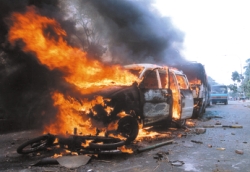|
Impressions
The
Product
of Apathy
SRABONTI
NARMEEN ALI
It was
just another average Thursday night. Families were holding
post-Eid dinner parties and friends were having late-night
adda sessions.
 It
was just another average Thursday night, until one by one,
cell phones started beeping constantly with SMSs, phone
calls pierced into the peaceful night, bearing bad news.
In hushed tones, Bangladeshis all over the country conveyed
what they had heard. There was a bomb blast on an Awami
League rally in Habiganj and Shah AMS Kibria, former Finance
Minister, was killed. It
was just another average Thursday night, until one by one,
cell phones started beeping constantly with SMSs, phone
calls pierced into the peaceful night, bearing bad news.
In hushed tones, Bangladeshis all over the country conveyed
what they had heard. There was a bomb blast on an Awami
League rally in Habiganj and Shah AMS Kibria, former Finance
Minister, was killed.
From
a small street in Dhanmondi an old man shakily dialed his
son's cell phone number, heaving a sigh of relief when he
heard a familiar voice say hello.
"Come
home," he pleaded, deaf to his son's protests that
he was safe, that he was nowhere near Habiganj and that
the bomb blasts had nothing to do with him and his friends.
He insisted that his son come home immediately, something
that he used to pride himself on never doing. Things were
different now. How far removed from politics one was made
no difference anymore. Bangladesh had done the inevitable.
It had fallen even further, sunk even lower, gotten ten
times worse. No one was safe anymore, no one was immune.
One
would think that after the horrifying events of August 21,
the people of Bangladesh would wake up and realise that
this was not just about politics or the ego battle between
the two women leaders of our nation. Rather, it was and
is an attack on our nation's safety, its security, its founded
belief of liberation. Unfortunately, after all the hype
of protesting and rallying, the pomp and circumstance of
foreign investigations and promises of justice, Bangladeshis
went back to their daily lives of indifference. Perhaps
people were to scared too speak out. Perhaps they were hoping
that someone, somewhere would do something to fix the toiled
and tattered mess that our nation has found itself in.
Sadly,
but predictably, no one did. And the sensationalism died
down because it wasn't relevant to us after a while. After
all, people die every day. Bomb blasts, grenade attacks,
assassinations, murders, riots are all a part of our everyday
lifestyle. The collective attitude of the public was to
remain indifferent and stagnant because it did not affect
us in a big enough way.
Five
months later an article came out in the New York Times by
a writer named Eliza Griswold, claiming that Bangladesh
was heading towards "the next Islamic Revolution."
Indignation and outrage seeped throughout Bangladesh as
people rebutted this statement, stating with full confidence
that it was an unfounded accusation. With suspiciously impeccable
timing the events of January 27 occurred, forcing all of
us to regurgitate our protests. The question on everyone's
lips is now, "Is Griswold right? Are we running headlong
into the next Islamic Revolution?"
 One
has to wonder whether it is true. The people's apathy is
a result of the government's pathetic attempt at arresting
criminals such as the now world-famous Bangla Bhai, their
continuous indifference towards the murders of activists,
political figures, writers and journalists, and their accusations
that Awami League had done this themselves, in order to
frame BNP. But one cannot hold only the government responsible.
It also has to be said that in the midst of her mourning
and wiping tears, the leader of the opposition still had
enough time and energy to use both bomb blasts as a great
opportunity to attack the government and to stand on her
soap box of discontent, finding faults in everyone but herself
and those in her party. This is politics, one may say --
this constant playground fight between two elderly women
-- but where does that leave our nation? At some point,
somewhere along the line, one would hope that they would
put aside their differences and try to make Bangladesh a
stable and safe environment that encourages freedom of speech,
religion and political ideologies. At some point, one would
hope that both women would act like adults instead of two
children in a sandbox, throwing sand in each other's eyes
to see who can oust the other from their territory. I always
thought that women would make better leaders than men, but
these women prove me otherwise. They are just as bad because
they cannot move past the my-husband/father-is-better-than-your-husband/father
complex. Instead they raise long buried issues from the
grave and harp on them incessantly. One
has to wonder whether it is true. The people's apathy is
a result of the government's pathetic attempt at arresting
criminals such as the now world-famous Bangla Bhai, their
continuous indifference towards the murders of activists,
political figures, writers and journalists, and their accusations
that Awami League had done this themselves, in order to
frame BNP. But one cannot hold only the government responsible.
It also has to be said that in the midst of her mourning
and wiping tears, the leader of the opposition still had
enough time and energy to use both bomb blasts as a great
opportunity to attack the government and to stand on her
soap box of discontent, finding faults in everyone but herself
and those in her party. This is politics, one may say --
this constant playground fight between two elderly women
-- but where does that leave our nation? At some point,
somewhere along the line, one would hope that they would
put aside their differences and try to make Bangladesh a
stable and safe environment that encourages freedom of speech,
religion and political ideologies. At some point, one would
hope that both women would act like adults instead of two
children in a sandbox, throwing sand in each other's eyes
to see who can oust the other from their territory. I always
thought that women would make better leaders than men, but
these women prove me otherwise. They are just as bad because
they cannot move past the my-husband/father-is-better-than-your-husband/father
complex. Instead they raise long buried issues from the
grave and harp on them incessantly.
The
question is not really who is to blame for these atrocities,
or what conspiracy is behind it. The blame-game has long
proved to be inefficient and irritatingly redundant, not
to mention hazardous to everyone. The real question is,
where do we go from here? What do 60-hour <>hartals
and rallies really do, aside from killing and injuring people,
and causing even more upheaval and discontent? How can we
enforce peace when our answer to violence and injustice
is retaliating with even more violence and injustice? Fighting
fire with fire is really not worth it at the end of the
day, because too many lives are at stake, too many mothers
are losing their sons, too many children losing their parents,
too many people losing their loved ones. Too many random,
innocent people are dying and all for what? Because Bangladesh
has gone from a country of national pride to a country lacking
in morals and human goodness. And we are all responsible
for it because that small handful of people struggling to
make a change is not strong enough without the support of
the masses. Our lack of action is further pushing our country
in the wrong direction and allowing terrorists and their
likes to take the law into their own hands. It is not the
government or opposition's problem anymore. It is ours because
the situation in the country is affecting our safety and
our security. It is not about the murder of a big politician
whose name and face we only see in newspapers and on television.
It's about our next door neighbour walking on the street
during a rally and being attacked. It is not about an Islamic
Revolution, it's about that little girl whose hands are
blown off during a bomb blast by "revolutionaries."
Our refusal to speak out against these injustices as a nation,
is responsible for Bangladesh losing its way, and leading
to chaos and anarchy.
Copyright
(R) thedailystar.net 2004
|
